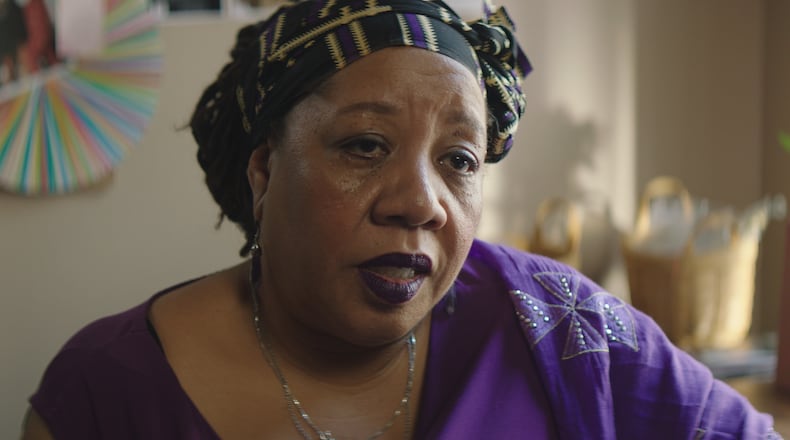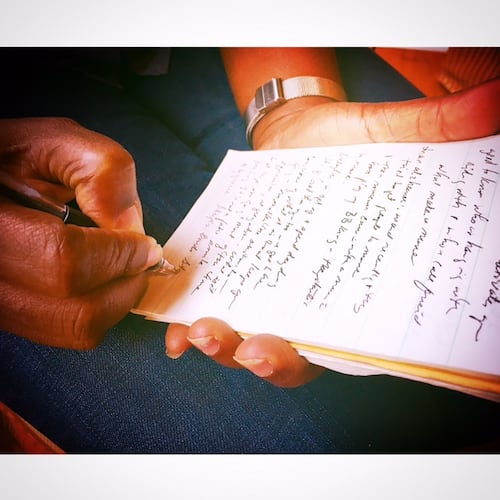In 1985, Dázon Dixon Diallo was a 20-year-old rising senior at Spelman College working part time at the Atlanta Feminist Women’s Health Center to help cover her tuition.
The AIDS epidemic was in its third year and unbeknownst to her was hitting African American women particularly hard.
Because surveillance of the epidemic incorrectly showed those most likely to get the deadly virus as homosexuals, hemophiliacs, heroin users, and Haitians, not much attention was given to women. Indeed, even women had to be convinced that they could even get HIV.
Women weren’t homosexuals, they didn’t account for most hemophiliacs as men did, and though they were in the midst of the crack epidemic, they didn’t make up the majority of injection drug users, Diallo said. They were, however, dying at Grady hospital by the hundreds of AIDS complications.
Despite that fact, no one was thinking of women in the context of AIDS.
And they still aren’t, said Diallo, founder of the nonprofit SisterLove Inc.
Why?
“Our systems are set up to respond to men’s needs and still have not evolved to include women’s needs,” she said.
That was true 38 years ago when, at the beginning of the epidemic, women were absent from or minimally engaged in epidemiological studies, and it is true now. In nearly every clinical trial of HIV drugs underway in this country, women are absent, Diallo said.
It isn’t like women aren’t being counted in infection rates.
Of the estimated 38 million people living with HIV around the world, more than half are women. What’s more, AIDS is the leading cause of death among women of reproductive age.
Although transmission is more common in some U.S. communities than others, HIV disproportionately affects African American and Latino women, and about half of new HIV cases each year are in Southern states like Georgia.
While it may make sense to have fewer women in studies focused on diseases that disproportionately affect men, research findings may overlook gender-specific harms or benefits when the proportion of men and women in the study is wildly different from what happens in the real world, Diallo said.
That’s because even when the disease is the same, women may have different symptoms than men and respond in unique ways to the treatments being tested.
In the absence of an HIV vaccine, the primary biomedical tool to stop transmission today is pre-exposure prophylaxis, or PrEP, the breakthrough HIV strategy that, when taken as a daily pill, is more than 90% effective at preventing sexually acquired HIV. To date, there are two drugs already approved by the U.S. Food and Drug Administration for PrEP: Truvada and Descovy. Both are made by Gilead Science. Both are said to be 99% effective in preventing HIV infection if taken every day.
The first, Truvada, has become an essential tool for bringing us closer to ending the HIV epidemic in the U.S. and around the world.
A 2016 analysis by the charity AMFAR found that women represented a median of 11% in cure trials and 19% of participants in trials of antiretroviral drugs. Vaccine studies were the closest to equitable participation, at 38%.
As long as women are excluded, Diallo is convinced an end to the epidemic won’t happen.
The lack of cisgender women in clinical trials of HIV drugs and the FDA’s willingness to tolerate studies that do not include them are indicative of a broader and more systemic disregard for women’s health, she said. (Cisgender refers to people whose gender identity aligns with the sex they were assigned at birth.)
Diallo has seen this firsthand.
Her first client was a woman from Columbia, South Carolina, a referral from AID Atlanta who’d moved to Atlanta in search of services and a support system that did not exist in her home state. Juanita Williams would become an integral part of SisterLove and a co-founder in the reproductive justice movement nearly a decade later.
“Her story is part of why SisterLove has never been confused about why HIV is a sexual reproductive health and rights issue,” Diallo said. “Juanita had been diagnosed with AIDS, denied services, and rushed out the back door, when she went to the local hospital to receive a free tubal ligation for low-income women.”
Indeed, most of the women whom Diallo met at the women’s health center and who were diagnosed with AIDS found out because they were pregnant and getting tested.
“If you’re not looking for women, you’re not going to find them,” Diallo said. “If you’re not acknowledging women’s experiences with HIV/AIDS, you’re not going to find us. And by virtue of those two things not happening, women from the beginning of the epidemic didn’t know they were at risk and didn’t know they were sick. Social safety nets weren’t available to them as a result of not being included.”
In 1985, the big question for Diallo, then a community relations coordinator at the feminist Women’s Health Center, was what were women in the reproductive health and rights movement going to do about it.
Come back Tuesday and I’ll tell you what Diallo had to say about that.
Find Gracie on Facebook (www.facebook.com/graciestaplesajc/) and Twitter (@GStaples_AJC) or email her at gstaples@ajc.com.
About the Author
The Latest
Featured




